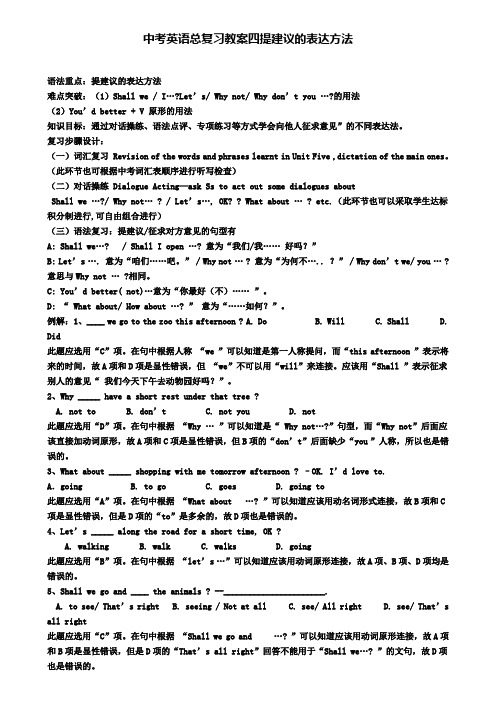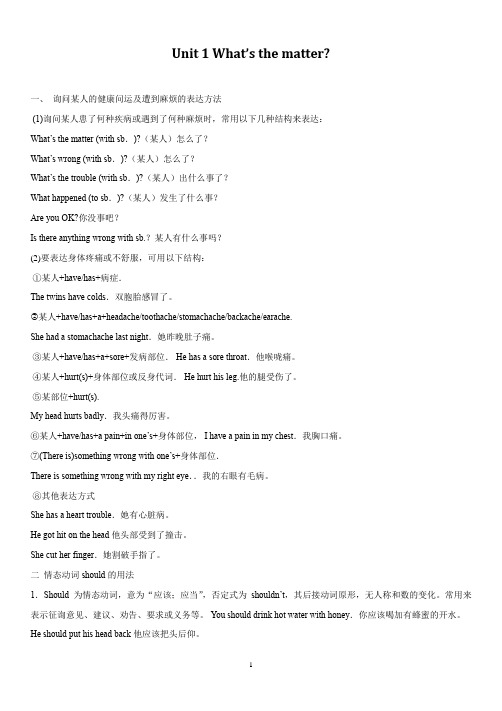unit 提建议和回答建议的表达方法
- 格式:docx
- 大小:7.97 KB
- 文档页数:2

中考英语总复习教案四提建议的表达方法语法重点:提建议的表达方法难点突破:(1)Shall we / I…?Let’s/ Why not/ Why don’t you …?的用法(2)You’d better + V 原形的用法知识目标:通过对话操练、语法点评、专项练习等方式学会向他人征求意见”的不同表达法。
复习步骤设计:(一)词汇复习 Revision of the words and phrases learnt in Unit Five ,dictation of the main ones。
(此环节也可根据中考词汇表顺序进行听写检查)(二)对话操练 Dialogue Acting—ask Ss to act out some dialogues aboutShall we …?/ Why not… ? / Let’s…, OK? ? What about … ? etc.(此环节也可以采取学生达标积分制进行,可自由组合进行)(三)语法复习:提建议/征求对方意见的句型有A: Shall we…?/ Shall I open …? 意为“我们/我…… 好吗?”B: Let’s …. 意为“咱们……吧。
” / Why not … ? 意为“为何不….. ?” / Why don’t we/ you … ? 意思与Why not … ?相同。
C: You’d better( not)…意为“你最好(不)…… ”。
D: “ What about/ How about …? ” 意为“……如何?”。
例解:1、____ we go to the zoo this afternoon ? A. Do B. Will C. Shall D. Did此题应选用“C”项。
在句中根据人称“we ”可以知道是第一人称提问,而“this afternoon ”表示将来的时间,故A项和D项是显性错误,但“we”不可以用“will”来连接。

给人提建议的英语作文格式英文回答:When it comes to giving advice to others, I believe it is important to approach it with empathy and understanding. It's crucial to put yourself in the other person's shoes and consider their feelings and perspectives beforeoffering any suggestions.One piece of advice I would give is to always communicate openly and honestly with the person you are advising. It's important to be transparent about your intentions and to provide constructive feedback in a respectful manner. For example, if a friend is struggling with a difficult situation at work, I would suggest sitting down with them and having a heart-to-heart conversation about their concerns. By actively listening to their thoughts and feelings, you can offer valuable insights and support to help them navigate through the challenges they are facing.Another important aspect of giving advice is to be non-judgmental and to refrain from imposing your own beliefs onto others. It's essential to respect the other person's autonomy and to empower them to make their own decisions. For instance, if a family member is seeking advice on a major life decision, such as changing careers, I would encourage them to explore their options and to follow their passions and interests. By offering guidance and encouragement, you can help them make informed choices that align with their goals and values.In conclusion, giving advice is a delicate art that requires patience, empathy, and understanding. By approaching it with sincerity and compassion, you can make a positive impact on the lives of others and help them overcome challenges with confidence and resilience.中文回答:当谈到给别人建议时,我认为重要的是要怀着同理心和理解去对待。


Unit 1 What’s the matter?一、询问某人的健康问运及遭到麻烦的表达方法(1)询问某人患了何种疾病或遇到了何种麻烦时,常用以下几种结构来表达:What’s the matter(with sb.)?(某人)怎么了?What’s wrong(with sb.)?(某人)怎么了?What’s the trouble(with sb.)?(某人)出什么事了?What happened(to sb.)?(某人)发生了什么事?Are you OK?你没事吧?Is there anything wrong with sb.?某人有什么事吗?(2)要表达身体疼痛或不舒服,可用以下结构:①某人+have/has+病症.The twins have colds.双胞胎感冒了。
某人+have/has+a+headache/toothache/stomachache/backache/earache.She had a stomachache last night.她昨晚肚子痛。
③某人+have/has+a+sore+发病部位.He has a sore throat.他喉咙痛。
④某人+hurt(s)+身体部位或反身代词.He hurt his leg.他的腿受伤了。
⑤某部位+hurt(s).My head hurts badly.我头痛得厉害。
⑥某人+have/has+a pain+in one’s+身体部位,I have a pain in my chest.我胸口痛。
⑦(There is)something wrong with one’s+身体部位.There is something wrong with my right eye..我的右眼有毛病。
⑧其他表达方式She has a heart trouble.她有心脏病。
He got hit on the head他头部受到了撞击。
She cut her finger.她割破手指了。


八下英语| unit4语法专练提建议常用句型及回答及状语从句一、用括号中所给单词的适当形式填空1. Why not take ( take) a walk tonight? It's the Mid-Autumn Festival today.2. Let's join (join) them in playing games.3. You'd better check (check)your homework again.4.You shouldn't smoke (not smoke) here. There are babies around.5.Would you mind moving(move) your car?二、单项选择(B)1.We build our country into a country of peace, a country of wealth, and a country of opening up.A. mightB. shouldC. could【解析】句意:我们应该把我们的国家建设成和平、富有、开放的国家。
might可能;should应该;could能,可能。
根据句意可知此处应是“应该”。
(C)2.-Could I ride an electric bicycle toschool,Mr.Wang?-No,you .Students under the age of 16 aren't allowed to ride electric bicycles.A. couldn'tB. needn'tC. can'tD. shouldn't【解析】句意:“王老师,我可以骑电动车去上学吗?”“不,你不能。
16岁以下的学生不允许骑电动车。
”couldn't用于过去时态的“不能”;needn't没必要;can't 不能;shouldn't不应该。
Unit 9 I like music that I can dance to.语法定语从句1.在复合句中,修饰某一名词或代词的从句叫做定语从句。
被定语从句修饰的词叫做先行词。
定语从句必须放在先行词之后。
定语从句主要由关系代词that,which,who(宾格是whom,所有格是whose)引导。
.This is the present that he gave me for my birthday.Do you know everybody who came to the party?2.当先行词是人时,定语从句由that,who引导,当先行词是物时,定语从句由that,which引导。
The person who broke the window must pay for it.The girl(who)we met yesterday is Li Lei’s sister.A dictionary is a book which gives the meaning of words.The fish(which) we bought were not fish.A plane is a machine that can fly.The dumplings(that)I made were delicious.练习:用适当的关系代词填空1. The house _______ we live in is very big.2. The boy ______ is wearing the black jacket is very clever.3. This is the present _____ he gave me for my birthday.4. The man _______ talked to you just now is an engineer.5. There is nothing in the world _______ can frighten him.6. We visited a factory _______ makes toys for children.3.当关系代词指物时,只用that不用which的情况.(1)当先行词为all、something、everything、anything、nothing、the one等不定代词时All that he said is true.(2)当先行词被the very(正是那个)、the only(唯一的)、the just(正是那个)修饰时This is the only dictionary that I have.(3)当先行词被形容词最高级修饰时This is the most beautiful city that I have visited.(4)当先行词被序数词修饰时。
提出建议英文提出建议英文give advicegiving advicemake a suggestionmake suggestionsmaking suggestionsthrow out a suggestionto make a proposalto table a proposal提出 put forward; raise; project; ...建议 propose; suggest; advise; re ...对……提出建议 give advice on就…提出建议 give advice on提出建议, 求婚 offer a proposal提出建 put forward a proposal, to; raise a proposal to 纷纷提出建议 offer proposals one after another提出建议,拨快(钟等) put forward提出建议 feedback - for ideas, suggestions comments要求提出建议 rfrequest for proposal可用以提出建议 shall we提出建议和提议 unit five:making suggestions and offers 向客人提出建议 lesson giving advice to visitors征询和提出建议 asking for and giving advice对于材料装卸方法提出建议 offer suggestions on materials handling methods感谢你好意地向我们提出建议 thank you for the suggestions you kindly offered us提出建议的另一个方法是说 it would be good to我们非常欢迎大家对包装方面提出建议 suggestions on packing are greatly appreciated给出建议 give suggestions采购单证文件被用来引诱潜在的卖方提出建议 proposals对别人的打法或其他技术上的事项提出建议 advice对市场分区及各区对品种的要求提出建议 variety/market segment best fit recommendation我们非常欢迎大家对包装方面提出建议860 our standardized packing has been approved by many foreign clients给出建议与评价 asking for and giving reactions and opinions建议,提出,意见 suggestion例句与用法The judge made recommendations to the court .法官向法庭提出建议。
Unit 1 When was it invented?语法一般过去时的被动语态1.一般过去时的标志词last week上周last month上个月last year去年last night 昨天晚上three years ago三年前three months ago三个月前three weeks ago三周前in the morning在早上yesterday昨天the day before yesterday前天just now刚才the other day前几天on those days在那些日子里2.一般过去时分为主动语态和被动语态:3.一般过去时主动语态的构成:一般过去时主动语态可以分成两类:一类是带be的,另一类是带实义动词的。
带be的各种句式的构成(1)肯定句的构成是:主语+ was/were +其他(2)否定句的构成是:主语+was/were + not +其他(3)一般疑问句的构成是:Was/Were+主语+其他?肯定回答是:Yes,主语+was/were否定回答是:No,主语+was/were +not(4)特殊疑问句的构成是:疑问词+ was/were+主语+其他?带实义动词的各种句式的构成(1)肯定句的构成是:主语+ 动词过去式+其他My father made the desk yesterday.(2)否定句的构成是:主语+ didn’t +动词原形+其他My father didn’t make the desk yesterday.(3)一般疑问句的构成是:Did +主语+动词原形+其他?Did you father make the desk yesterday? Yes,he did.No,he didn’t.肯定回答是:Yes,主语+did.否定回答是:No,主语+didn’t(4)特殊疑问句的构成是:疑问词+ did +主语+动词原形+其他??My father made the desk yesterday. When did your father make the desk?5.一般过去时被动语态的构成:主语+was/were+动词过去分词+by短语+其他The house was built in 1967.(1)否定句的构成是: 主语+was/were+not+动词过去分词+by短语+其他The house was not built in 1967.(2)一般疑问句的构成是: Was/Were+主语+动词过去分词+by短语+其他Was the house built in 1967? Yes,it was.No,it wasn’t.肯定回答是:Yes,主语+was/were否定回答是:No,主语+was/were +not(3)特殊疑问句的构成是:疑问词+was/were+主语+动词过去分词+by短语+其他The house was built in 1967. When was the house built?(1)My brother broke a bowl last night.(改为被动语态)A bowl by my brother last night.(2)Every year the organization collects money to help the old people.(改为被动语态)Every year money by the organization to help the old people.(3)We call math the language of science.Math the language of science.(4)Did Tom work out this problem? (改为被动语态)this problem by Tom?(5)One of the classrooms was often cleaned.(改为否定句)One of the classrooms often .(6)—Did you win the basketball game?—Bad luck,our team in the final one..A.wonB.beatC.was wonD.was beaten(7) This kind of bike in Suzhou in 2011.A. was madeB. madeC.was makingD. makes(8)___________ tea plants grown in Hangzhou?A. DoB. DidC. WasD. Were(9)The doctor looked over Peter carefully after he to the hospital.A. takesB.is takenC.tookD.was taken(10)The bridge_____ by the local people in 2000.A.builtB.was builtC.buildD.was buildSection A1.invent动词,意为“发明” inventor名词,意为“发明家”invention 可数名词,意为“发明”Edison invented the electric light.Edison was a great inventor. The telephone is a useful invention.Edison was a great .He over 1,000 during his life.A.invent;invented;inventionsB.inventor;invented;inventionC.inventor;invented;inventionsD.inventor;invents;inventions2.区分invent 和discover(1)invent指客观上不存在的东西后来被人发明(2)discover意为“发现,找到”,指发现或找到某种自然界本来已存在,但以前未被人发现或认识的事物。
(一)英语中常见的提建议的表达方式
1:Why don't you ,,,/ Why not ,,,?后接动词原形
例如:
Why don't you have a picnic with us ?为什么不和我们一起去野餐呢
Why not get her a book ?为什么不给他买一本书呢/
2; How about ,,,?/What about ...?后面接名词,代词或动名词。
例如:
How/What about this blue scarf ?这条蓝色围巾怎么样呢
How /What about going fishing this afternoon ?今天下午去钓鱼怎么样呢
3;You'd better (not) do sth 意为“你最好(不)做某事。
例如:”
You'd better take off your coat ,It's hot inside.你最好脱下你的外套,里面很热。
You’d better not sleep too late. It’s bad for your health.
你最好不要熬夜,那对你的健康有害。
4;Let's ...,shall we ? 后面接动词原形,意为“让我们…,好吗”
Let 's take the children to the park ,shall we ?让我们带孩子去公园好吗
Let’s meet at seven o’clock , shall we? 让我们起点碰面,好吗
5:Shall we /I...? 后面接动词原形,意为“我们/我…好吗”,例如:
Shall we go boating?我们去划船好吗
Shall I open the window ?我打开窗户好吗
6: Would you like ...?后接名词或动词不定式,意为“你。
想要吗”
例如;
Would you like a cup of tea ?r你想喝杯茶吗
Would you like to go shopping with us ?你想跟我们购物吗
7: Would/Could/Will/Can you please ...?后面接动词原形,意为“请。
好吗”
例如:Would you please turn down the radio ?请你把收音机的音量调小点好吗(二) 回答建议的表达方式
1:同意对方的建议时,一般用:
Good idea.
That 's a good idea.
OK/All right .
Yes ,please .
I'd love/like to.
No problem .
I agree with you .
Sure ./Of course /Certainly. Yes ,I think so ./I will.
2: 表示委婉谢绝是常用:
I don't think so ./
Sorry ,I can't.
Sorry ,but...
I’d love /like to ,but ...
I'm afraid ...。